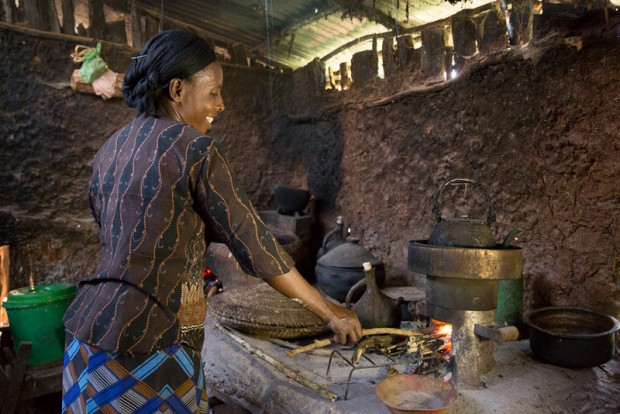
Mulane Jabessa using her cookstove. Jabessa is a coffee farmer in the Oromia region of Ethiopia, where the Oromia Coffee Farmers’ Cooperative Union participated in a pilot program for the Fairtrade Carbon Credit program.
We’re still catching up on news from the 2015 United Nations Climate Change Conference (COP21) that took place in Paris earlier this month, where coffee, out of all other agricultural sectors, arguably stood tallest as a unified industry through several broad partnerships among a range of players invested in climate adaptation and emissions reduction.
Specific initiatives launched or fortified during the conference and its associated meetings included a campaign led by Conservation International to make coffee “the first sustainable agricultural product in the world.” There was also the formalization of plans from leaders in the Costa Rican coffee industry and their global partners to make the country’s coffee producing sector completely carbon neutral by 2021.
Yet another broad initiative aimed at addressing the effects climate change in the coffee sector was brought to light at COP21 by Fairtrade International: Fairtrade Carbon Credits. The carbon credits program follows the Fairtrade Climate Standard, introduced in October and developed in coordination with The Gold Standard, a Switzerland-based third-party certifier specializing in accountability for greenhouse emissions projects and climate-related funding.
In short, each Fairtrade Carbon Credit represents one less ton of carbon dioxide entering the atmosphere. Organizations or individuals of any kind can purchase credits to support their own carbon-neutrality goals, while Fairtrade, The Gold Standard and project partners work with participating coffee producers to enact simple solutions in renewable energy (e.g. solar, wind), energy efficiency (e.g. improved cookstoves, water filtration) and agroforestry (e.g. shade trees, replanting deforested areas).
The Climate Standard and Credit program is in some ways a carbon-focused twist on the existing Fairtrade model, where producers enact programs locally such as introducing stoves that don’t contribute to deforestation or planting shade trees, earning Fairtrade Carbon Credits in the process. They are then paid a minimum for those credits, then a fairtrade premium for additional investments locally in coffee and/or community.
The idea is that while coffee farmers, for example, at origin produce very few emissions relative to the rest of the human world, they nonetheless represent the most vulnerable population as climate change occurs, as coffee plants are sensitive to temperature changes, and increased pest and disease outbreaks. Projects developed through the program are intended be customizable on a local level to any number of climate adaptation strategies.
Following its official unveiling at COP21, the Fairtrade Carbon Credit program is initially rolling out in Germany, the Netherlands and Belgium. See Fairtrade’s Carbon Credit page for additional information. And here’s a handy animated video from Fairtrade summing up the program:
[vimeo 145655805 w=620 h=349]
Nick Brown
Nick Brown is the editor of Daily Coffee News by Roast Magazine.






Comment